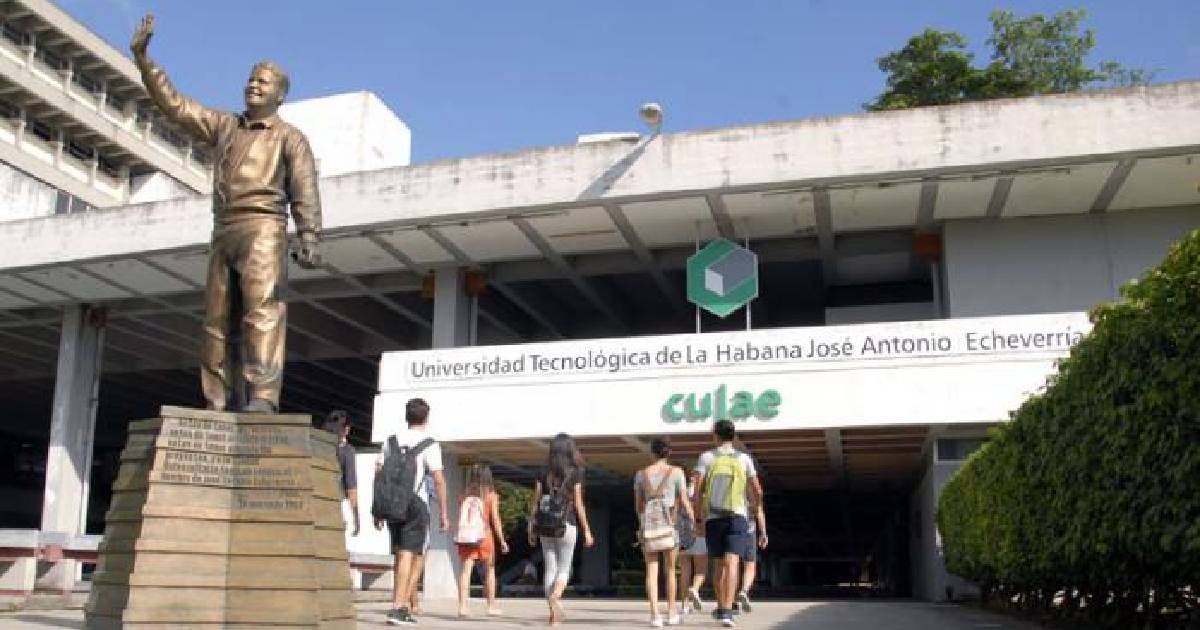The José Antonio Echeverría Technological University of Havana (CUJAE) has initiated a process to lease campus spaces to private enterprises. The available spaces include two dining establishments (one in the Faculty of Architecture and another in the Scholarship Dining Hall), a mobile food stand, a locksmith, a beauty salon, and a point of sale for agricultural products. Most opportunities are concentrated in the Scholarship Dining Hall, offering four distinct spaces for a gastronomic center, a locksmith, a beauty salon, and an agricultural product sales point.
Meanwhile, a location is up for bids in the Faculty of Architecture for another dining establishment, and elsewhere on campus, a mobile kiosk is planned for selling light snacks, confections, and more. The process was announced via CUJAE's Facebook page on the evening of June 18, with applications being accepted from June 12 to June 25, between 9:00 a.m. and 4:30 p.m., at the institution's General Logistics Directorate.
Is It a Genuine Opportunity or a Manipulated Process?
Some commentators on the announcement have raised concerns regarding the unusually short seven-day window for submitting proposals, from the posting date on June 18 to the deadline on June 25. This limited timeframe has led some to speculate that the process may be tailored to benefit pre-selected applicants.
Yorch Louis, a user commenting on the post, expressed skepticism: “Today is June 19 and you’re announcing a bidding process when the campaign is already underway and set to close in a week. Who can create and submit a solid project in such a short time? The rush and improvisation suggest pre-arrangements with known beneficiaries.”
Echoing these concerns, Bryan Pérez remarked, “It’s because they already know who will get the spaces,” implying that the terms might be rigged. The lack of public information regarding the evaluation criteria has fueled doubts. According to the details provided, the bid opening is scheduled for June 26 to July 2, with results being announced on July 9. However, the criteria for selection and reference amounts remain undisclosed, leaving the economic model behind these allocations a mystery.
Not everyone views the process with suspicion. Luis Suárez Castañeda nostalgically recalled the variety of services that once existed on campus, expressing hope for their return. He even dreams of the Student House, a once beautiful space now marred by neglect and decay, being revitalized by a microenterprise or the City Historian's Office.
Despite the enthusiasm, the reality of an accelerated and opaque process looms, with some fearing that backdoor deals overshadow any genuine intentions. Amidst Cuba's profound crisis impacting the state-run service sector, the Cuban government has authorized measures to transfer some state-managed premises to private hands, a move intended to invigorate domestic trade in the face of the state's incapacity.
Private Initiatives: A Double-Edged Sword?
Recently, Empresa de Gestión del Patrimonio S.A., linked to the Office of the Historian of Havana, launched a public tender to temporarily lease state spaces along the Malecón. Touted as a “unique opportunity” for proposals in gastronomy, retail, cultural, and recreational activities, the announcement prompted more questions than excitement.
On one hand, social media users questioned the viability of these spaces, located in a fragile coastal area, while some viewed the push to revitalize the Malecón through private efforts as the state shirking its urban maintenance responsibilities. In May, it made headlines that spaces at the Anti-Imperialist Tribune José Martí were being leased for events, with rental prices reaching up to 28,000 pesos per day. However, shortly after being announced by the official Cubadebate website, the announcement was retracted, sparking speculation about whether the Cuban government reversed the decision or is quietly reconsidering the controversial proposal.
In March 2023, the state-run Empresa de Grabaciones y Ediciones Musicales (EGREM) in Santiago de Cuba initiated bids for commercial spaces in the province. Similarly, the Antonio Maceo International Airport in the eastern city opened bidding for its dining spaces to Cuban private companies, aiming to enhance “the satisfaction of both external and internal customers by increasing dining services.”
In June 2022, it was revealed that the government would auction 300 establishments from the food service network for the first time. At that time, the Minister of Domestic Trade, Betsy Díaz Velázquez, acknowledged that Cuba's domestic trade required a transformation that the state could not undertake alone, and that commercial units with greater autonomy and concessions operate more efficiently and contribute to sales stability.
Understanding the Leasing Process at CUJAE
Why is the leasing process at CUJAE controversial?
The process has sparked controversy due to the short timeframe for proposal submissions and concerns that it may favor pre-selected applicants, along with a lack of transparency in the evaluation criteria.
What types of businesses are being considered for CUJAE's leased spaces?
CUJAE is considering a range of businesses, including dining establishments, a mobile food kiosk, a locksmith, a beauty salon, and agricultural product sales points.
What is the timeline for the leasing process at CUJAE?
Applications are accepted from June 12 to June 25, with the bid opening taking place from June 26 to July 2, and results announced on July 9.
